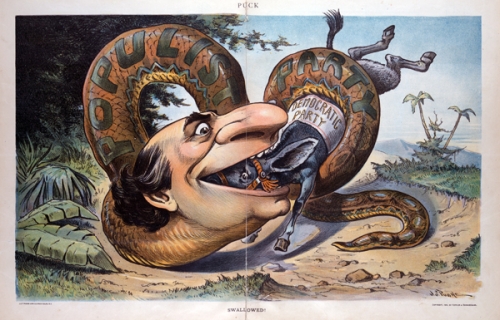
Should populists be demonized? Today especially, after Donald Trump’s latest victory in securing a seat as President of the United States of America, this topic is incredibly relevant. But one might ask: How did he win? Trump’s campaign was largely centered around garnering anti-systemic attention from voters that cited exasperation at their treatment by the current government and its long-standing convoluted bureaucracy. Voters united around a common goal: to elect anybody but Hillary Clinton, the ultimate representation of the so-called system. So, is Donald Trump a populist? Is he a voice for the people? And how do we then categorize Bernie Sanders? Has populism as a phenomenon been demonized all over the world? Are Donald Trump’s election and the entire Brexit campaign examples of the adverse results of populism?
Bard College Berlin’s Politics, Rhetoric and Debate (PRD) society held a spectacular debate (Friday, Nov 18th) to analyze these questions in light of the recent elections. The motion was “This House Regrets the Demonization of Populists.” Side government voiced its regret that such demonization has occurred, and side opposition argued that the use of this tactic against populists is completely justified. The terms government and opposition used in this context debate are borrowed from traditional British Parliament wherein the government supports the said motion while the opposition opposes it.
What is populism? Friday night’s debate defined it as an anti-establishment voice of the people that is often represented in a figure, namely the populist. This definition could be extended to include his or her followers as well, all true believers in the rights, virtues and power of the people. Democracies have proven themselves to be a stronghold of Western political practice insofar as they seem to desire to serve the people and listen to their voices. Does this not include populists, the Government asks? If we live in the social era of free speech and the right to raise our own opinion, we are disabling this system by demonizing populists. We are essentially allowing selective democracy and silencing those whose voices we don’t necessarily agree with, especially in Western countries like the United States where the system has proven that it doesn’t always work in favor of the public.
Friday night’s debate saw the Government claim that, when large numbers of people vote in favor of a movement, it is counterproductive to ignore those votes. By demonizing populists we are essentially ignoring those votes, specifically of people like Bernie Sanders. Sanders’ anti-establishment, revolutionary campaign rose highly amongst the younger crowd who were seeking a new form of governance that stood out from the regular systematic procedures. These are the populists that we regret demonizing, exclaim the Government. Populists are bringing forth voices that otherwise get lost in the bureaucracy of the system — whether it’s Bernie Sanders in the United States, Narendra Modi in India, or Jeremy Corbyn in the United Kingdom. Corbyn and Sanders, especially, have been praised for their ‘for-the-people’ attitudes and campaigns. Shutting down these voices is what paves the way to systems like fascism.

But what does a rule-breaking system like populism do to a country whose strongholds are not only democracy but procedural regulations? A system like populism allows for campaigns and protests to become about idealistic values that let down far more people than they inspire. The Opposition side argued that, when we allow populists to spew their rhetoric, we are normalizing that behavior. They also seem unable to run a government alongside non-populists, which is a huge problem in itself. Take the Kaczyńskis in Poland or Vladimír Mečiar in Slovakia, who seemingly adapted an autocratic style of ruling; or Venezuela’s Hugo Chávez, whose policies and actions are often a slap in the face of liberal democracy. These leaders, all known for their incredibly divisive rhetoric, slowly become problematic in the face of governance. Hungary’s Viktor Orbán is a fantastic example of such a populist. He is the epitome of charisma, yet is seemingly unconcerned with the interests of the people. More importantly, their rhetoric is dangerous. We allow voices like those of Donald Trump into the system, we let them slither their way into our democratic mindset, and let the poison set in “for the sake of democracy”. We begin to normalize rhetoric and behavior that is fundamentally incompatible with Western democratic norms. Perhaps it is appropriate to say that the demonization of populists has, with regards to its implementation, done countries more good than bad.
In the end, populism exists to bring the voices that are otherwise overshadowed by bigger sociopolitical or socioeconomic elements to the front. It is also true that they might only survive in government systems whose core is in the people. But to what extent do populists today live up to that standard? Are they capable of running a government? Populists have long been berated for being too idealistic, even though their essential goal is to encourage people to have the right to their own voices. Are they succeeding, or is populism going to become yet another distraction from systematic bureaucracy? Personally, I think that democracy should exist to encourage voices without relying on an outside ideology like populism. Of course, this is idealistic and possibly won’t happen in the near future. But I believe that movements such as populism are paving the way for such organization. In the meantime, it is in the hands of the populist to carry it forward constructively and with the people’s best interests in mind.
[hupso_hide]
